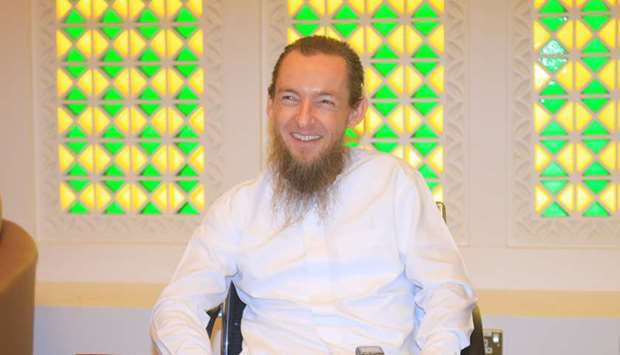Ramadan is called the month of countless blessings from Allah. The holy month also carries a social aspect in which large congregational prayers are offered along with community Iftar and Suhoor.
The situation is very different this year because of the novel coronavirus global pandemic and the resultant lockdowns and social distancing measures. However, as Muslims believe there is heavenly blessing in every difficult situation, the faithful see it as an opportunity to cement their connection with Allah.
Dominic Foley, a British Da’ee, sees the health crisis as an opportunity providing more time for spiritual reflections and connecting to Allah during Ramadan.
“Until recently I could be found showing people around the State Mosque of Qatar and introducing many to Islam. The lockdown, and nothing happens but by the will of Allah, has resulted in my being stuck in the UK. Last year I chose to be in the land of the Muslims; this year I chose to be by the side of my family.”
Reflecting his thoughts on Ramadan, Dominic, who embraced Islam in 2004, said: “Ramadan is always a time for spiritual reflection, of drawing closer to Allah and reading the Qur’an. But, this year brings a different perspective. Because social gatherings are banned – Iftar and Suhoor parties and prayers in the mosque – the excesses many indulge in, especially at the time of breaking the fast, have been curbed and solitude is enforced.
“I am also reminded of the Prophet Muhammad (peace be upon him) secluding himself in the cave of Hira and his being given the revelation – a weighty word indeed; of the early Muslims having little to no companionship in their faith; and of the Children of Israel – the Muslims of their day – being forced to pray in their homes to avoid the tyranny of the time. It necessitates a turning to Allah for strength and support.”
Such reflections give Dominic hope and courage. “Being confined to one’s home affords us the opportunity to experience what life is like – and I am not saying they are the same – for those members of our community who are housebound because of age or illness or those in prison. Loss of liberty, and liberty we take for granted, is now giving us a little insight into those people who are living in societies which don’t afford their citizens the same right. It can take the loss of a blessing to realise what a blessing it was.”
The Da’ee believes that still there are blessings. “For those who didn’t appreciate what they had, now is the time to repent and humble oneself to the Creator and start counting the blessings we do have. Islam teaches us to be positive in every situation, and that for those who believe in Allah there is good in every circumstance even if we might need little extra patience and reliance on Allah because we don’t quite see His wisdom just yet.”
Dominic further said: “For many, the sense of community, which is such a key feature of Ramadan for the Muslims worldwide, is gone. The gatherings for Iftar, Suhoor and praying in the mosque are no more. In its place is recognition of the inner and personal aspect of Ramadan – namely, one’s relationship with our Creator.
“While Islam has a social aspect to many of its worships and practises at the heart of it, all is the individual’s relationship with his or her Lord. This year many of the ordinary distractions are removed, there is less food, less work, less company. Now is the time to get comfortable being alone and alone with Allah. This is not easy for some and of course there’s always temptation. The devil has his ways but we choose to let him into our home and while away our time with (un)social media, television, movies and the like. There’s a common phrase called ‘killing time’; well this is always a waste of life but more so in this month.”
Elaborating further on the spirit of worship, the Da’ee said: “Fasting is acknowledged as being a sincere act for Allah, because in reality none can see the fasting person except for Allah. For those who take their religion as amusement and diversion this lockdown may teach them that and afford them a chance to make amends. If it is difficult to pray at home, be they the obligatory prayers or the night prayers, or to guard one’s gaze from unsuitable images and sounds on television, when no one (save Allah) is watching us then perhaps our intention to worship was wrong. This year we have a chance to learn what our intention really was and turn back to Allah sincerely.”

u201cFor those who didn’t appreciate what they had, now is the time to repent and humble oneself to the Creator and start counting the blessings we do have. Islam teaches us to be positive in every situation, and that for those who believe in Allah there is good in every circumstance even if we might need little extra patience and reliance on Allah because we don’t quite see His wisdom just yetu201d u2013 Dominic Foley
